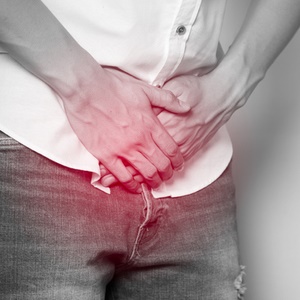
A prostatectomy is a surgical procedure that involves the removal of the prostate to treat prostate cancer. This is a common treatment option with a good prognosis. Radiation can also be used to treat the condition.
Urinary incontinence — a common side-effect
Unfortunately, these two treatments can have a significant side-effect – urinary incontinence. When the prostrate is removed through surgery, or the cancerous cells are zapped with either an external beam or radioactive seed implants, it can disrupt the way urine is held in the bladder.
Surgery can damage the nerves that provide control over the bladder, while radiation decreases the amount of urine that the bladder can hold. It may also cause spasms that can lead to urine leakage.
Surgeons try their best to preserve as much of the area around the urethra and sphincter as possible to limit the effect of urinary incontinence, but it remains likely that urinary incontinence will occur after treatment.
According to the Continence Foundation of Australia, men who’ve had a prostatectomy often say that urinary incontinence is the biggest challenge they have to cope with during recovery. Most men, however, will regain bladder control within six to twelve months after the surgery.
Why does this happen?
The prostate gland is roughly the size of a walnut and sits at the base of the bladder. The urethra is the thin tube that carries semen and urine and this runs directly through the prostate gland. The bladder neck sphincter is the ring of muscles where the urethra and bladder join. When the sphincter is damaged during surgery or through radiation treatment, urine can involuntarily leak out of the bladder, because the sphincter can no longer close properly.
How to manage urinary incontinence
While incontinence will usually improve over time, it’s important to learn how to control your pelvic floor muscles to be able better to manage urinary incontinence. You can also contact your medical professional or urologist for help.
Here are some further tips:
- Reduce the number of drinks that you consume during the day, especially alcohol and caffeine, as these can irritate the bladder.
- While it’s important to control fluid intake, it’s also vital not to become dehydrated, as more concentrated urine will also irritate the bladder.
- Avoid fluids before you go to bed to help reduce the number of times you need to go to the bathroom during the night, or to avoid leakage while you sleep.
- A catheter will be fitted after surgery. When the catheter is removed, you might, however, start dripping urine. Take control by stocking up in urinary incontinence pads.
- There are medications that may help the muscles of the bladder or the nerves regain control of the urine flow. Speak to your doctor about this.
Image credit: iStock




 Publications
Publications
 Partners
Partners










